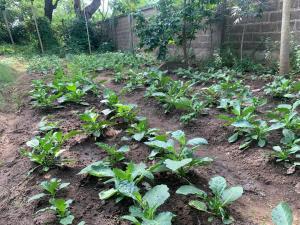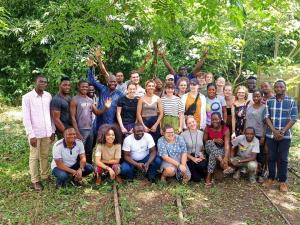Agroecology: Creating Sustainable Nurseries
Breakdown:
- Accommodation and food: 70.00 Euro
- Transportation: 25.00 Euro
- Activities: 70.00 Euro
- Hosting organisation support: 55 Euro

Description: This summer, ASTOVOT is launching a volunteer workcamp focusing on agro-ecology and tree nurseries on its small farm in Kpalimé. The project involves young people and adults in activities linked to sustainable agriculture, natural resource management and plant production. For ASTOVOT, the initiative makes it possible to combine the principles of ecology with agriculture, with the aim of promoting farming practices that are environmentally friendly, resource-efficient and adapted to local realities.
Type of Work: Planting and caring for young plants: Preparing and maintaining seedlings (trees, fruit trees, vegetables, etc.) in the nursery. Composting and organic waste management: Create compost from green waste and other organic matter to enrich the soil. Raising awareness of sustainable agriculture: Organise awareness-raising sessions on the benefits of agroecology and sustainable cultivation techniques. Setting up sustainable irrigation systems: Teaching environmentally-friendly irrigation techniques.
Study Theme: Aims of the project : Raising awareness of agroecology: Young participants can discover the basics of agroecology, learn how farming systems can be made more sustainable, and understand the importance of preserving biodiversity, soil and water resources. Setting up a nursery: They will be involved in setting up or managing a nursery, a space where young plants (trees, vegetables, etc.) are grown before being transplanted to fields or gardens. The nursery can also play a key role in reforestation. Learning sustainable farming techniques: using compost and organic fertilisers,
Accommodation: Accommodation is simple and adapted to the project location. Volunteers are accommodated in groups of three or four per room, with flexible arrangements to ensure a mix of sexes. Depending on the site, dry toilets and waterless showers may be available. The association provides plastic or foam mats, and volunteers can bring their own sleeping bags if possible. Drinking water is available on site, but access to electricity and the Internet may be limited due to load shedding and difficulties accessing the network.
Language: The main languages on the project are English and French. However, we recommend that non-French speakers have a basic knowledge of French before they arrive, as French is the official language of Togo. In addition, the vast majority of local volunteers and community members have a limited level of English.
Requirements: Acquiring new skills: Volunteers learn modern, sustainable farming techniques that can be applied in their own lives.
Commitment to the environment
Strengthening social ties: Working together on community projects strengthens cohesion and social ties between national and international volunteers
Approximate Location: Kpalimé, around 1h30 from Lomé, is a haven of natural beauty. Situated in south-west Togo, the region surrounding the town is lush and fertile, lined with wooded hills, deep valleys and small farming villages. Kpalimé is also the country's main craft centre, home to numerous artists and artisans, including woodcarvers, batikeurs, potters, weavers and calabash makers. Nature walks and hikes allow you to discover the paths leading to the daily life of the inhabitants, who are mainly farmers.
Notes: Throughout the work camp, the volunteers will prepare their meals as a group, alternating domestic tasks, including cooking. In addition to the main activities, walks, hikes, festive outings and cultural encounters are organised, allowing volunteers to discover Togolese culture and meet the local people. At weekends, group excursions are organised to explore the region's tourist sites.
Camp Photographs

